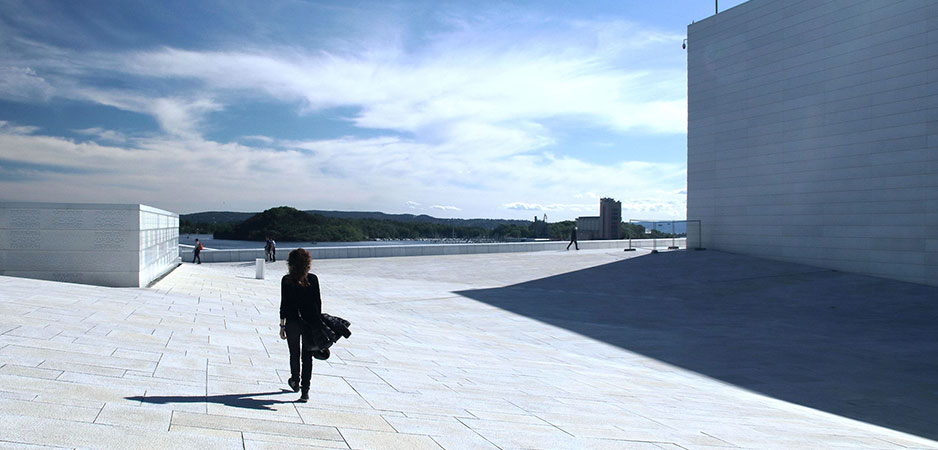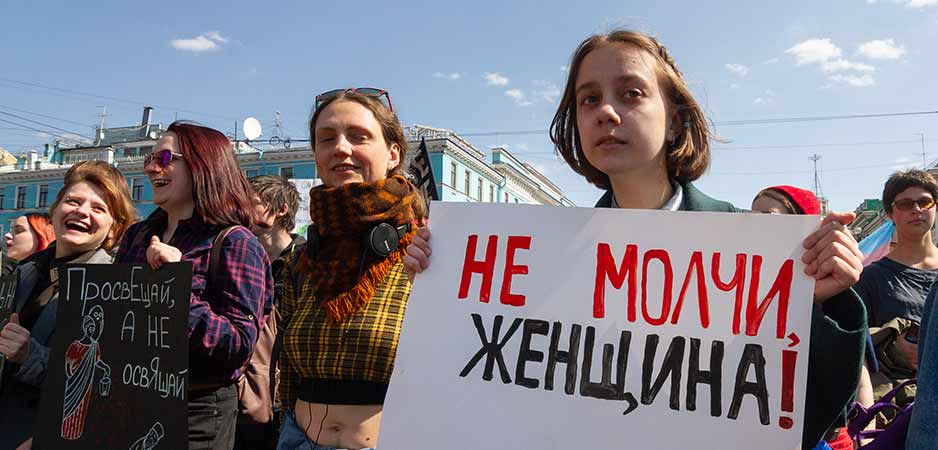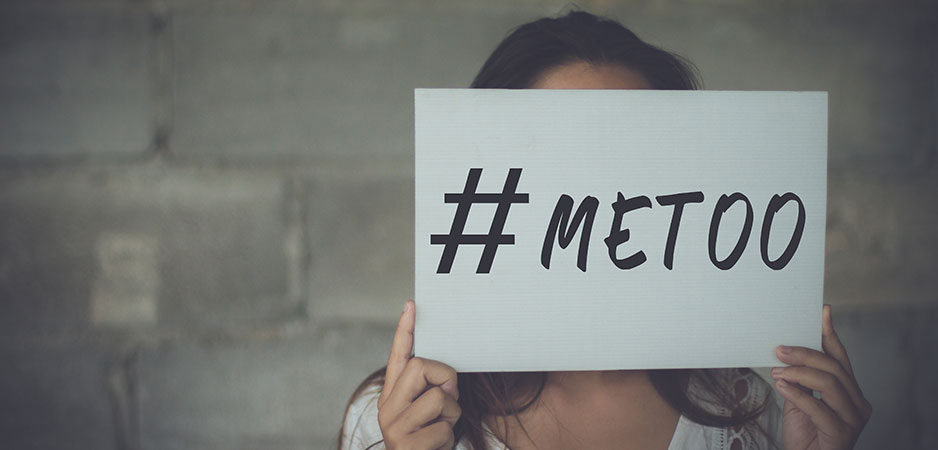The hype around equality in Scandinavia could lead many to believe that parity between men and women has been achieved. The region tops international statistics for equality, well-being and happiness, but in the last few years Scandinavia has also witnessed the biggest #MeToo scandals in its history. Four decades of state feminism, with governments intervening directly to implement gender equality, have clearly not been enough to end patriarchy and guarantee women’s safety.
360˚ Insight: For Nigeria’s Women, the Threat of Sexual Violence Is Never Far Away
State feminism was coined by Helga Hernes in 1987. It was seen as a system where legislation and gender quotas would ensure gender balance in political representation, workplace equality and protection from discrimination. Scandinavia has been idealized internationally because of gender parity as well as economic equality due to redistribution of wealth. Norway topped the United Nations’ Human Development Report again in 2019, and four Nordic countries are among the five happiest in the world according to the UN’s World Happiness Report.
Not All Rosy
But all is not that rosy. The Swedish Academy, which awards the Nobel Prize in Literature, put its operations on hold in 2018 due internal conflict and a culture of sexual harassment. Jean-Claude Arnault, a French photographer and cultural icon at the heart of the scandal, was convicted on two rape charges, with 16 more allegations pending against him. The revelation led to the biggest scandal the institution has seen and led to the resignation of six out of its 18 board members.
Arnault was the director of the cultural center Forum which hosted meetings and served as a meeting point for literary high society. Forum also had financial ties with the Swedish Academy and Arnault’s wife, Katarina Frostenson, who was also chair of the academy.
The scandal received widespread media attention in Scandinavia, helped by the publication of Frostenson’s book, “K.” Frostenson, a highly regarded poet, writes beautifully and defends Arnault, whom she sees as “being frozen out of Sweden.” Frostenson left Sweden for France because of the scandal and a culture she says did not understand “French playfulness and flirting.” She went on to accuse the women who raised the assault allegations of lying and for having ulterior motives to further their own careers.
But it is not only the arts that are affected by #MeToo scandals in Scandinavia. The world of politics has been shaken too, especially in Norway. Here, the Labor Party (Ap), has suffered a serious setback in the last few years due to a combination of ideological internal conflicts between the left and the right wings of the party and a sexual harassment investigation of its deputy leader, Trond Giske. Ap saw its worst-ever local election result this September.
The #MeToo allegations were top news in Norway for most of 2018. Giske had a reputation of out-of-control drinking, “wandering hands” and sexual harassment, but has never been accused of sexual violence. He was forced by the party leadership to step down from national politics in 2018 following the allegations. Journalists from the newspaper Verdens Gang (VG) drove the investigation, provided evidence and continued following Giske after he withdrew from national politics.
But Giske was not willing to apologize and leave politics completely. He was elected to the board of the Workers’ Economic Joint Organization in Trondheim, Norway’s third-largest city. The same day, a trade union official sent a video of Giske dancing with and embracing a woman in a popular Oslo bar, meant as proof of yet another case of sexual harassment. The women Giske had danced with had filmed the encounter and put it on Facebook themselves, but an overzealous trade union official passed it on to the party leaders. VG got hold of it, and Giske faced another crisis. The newspaper has since apologized and has also amended some of the coverage of the case.
High-level discussion in the media followed, much of it focused on the ethics of the paper’s methods and speculations around its motives. Has the severity of the attacks on Giske, for example, been about more than trying to protect women and selling papers? Could it have been part of a bigger campaign to destroy not only Giske, but the Ap’s left wing?
It turned out the young women Giske had “latched onto” in Oslo were not too bothered by his behavior and did not want to report it to the media, the party or the police. On the other hand, they said they left the bar when they started to feel “uncomfortable.” The current leadership of the Ap used the video as evidence of sexual harassment and another indication that Giske needed to leave politics altogether, compounded by the many other cases of women who had come forward accusing him of sexual harassment and predatory behavior.
Senior party officials, including female leaders, have been blamed by other top politicians for using the Giske case to advance their own political career, ideological position and not taking the accusations seriously. #MeToo and the conflicts it provoked appear to have robbed Ap of a national election win in 2017 and have paved the way for a second term for a coalition led by the mainstream right Conservative Party (H), the radical-right Progress Party (FrP) and the Christian Democratic Party (KrF).
No Strangers to Controversy
There is no doubt that Trond Giske abused his power, derailed young women’s careers and put many off politics, but he has never been accused of rape, as is the case with several leaders of the governing coalition. None of the right-wing men have attracted prolonged media attention, but few senior politicians on the right have left politics altogether because of #MeToo. Most have clung to power or returned after short breaks.
Many political commentators are asking why there is so much focus on Ap and Trond Giske when politicians with pending rape allegations and ongoing investigations are being allowed to continue as they are.
Kristian Tonning Riise, the former leader of the Conservatives’ youth party and an elected member of parliament, resigned in 2018 due to several sexual harassment allegations. The FrP MP Ulf Leirstein also left his job as parliamentary leader and spokesman for justice in 2018, following revelations he had sent porn to children and invited young party members to a threesome. In 2019, after new allegations surfaced, he withdrew his party membership, but the FrP says it isn’t interested in investigating the case.
This is not the first time allegations of sexual impropriety have hit the FrP. In 2011, Trond Birkedal, a senior politician, was imprisoned for having sex with and filming teenagers he had groomed on the internet.
One of the most important sexual abuse cases in the public domain involves the FrP politician Terje Soviknes. In 2001, it became known that Soviknes had had sex with a 16-year-old girl at the FrP youth party’s event the previous year. Witnesses said the girl had been intoxicated with alcohol, and Soviknes was accused of taking advantage of her. This became known to the leadership, and Soviknes was consequently forced to leave his position.
In the context of #MeToo, the woman in question has demanded compensation and claims she was raped in 2000; she was interviewed again by the police last year. The woman has since had serious mental health problems that required hospitalization. Back in 2001, the case was shelved, and Soviknes aplogized, but insisted that the girl had consented. Soviknes left national politics as a result of the case but continued to serve as the mayor of the town of Os. In 2016, he was invited to serve as a minster for oil and energy, but resigned in 2018 to spend more time with his family.
Last year, two senior FrP politicians were accused of sending indecent material and invites to a young party member. The politicians and the way FrP dealt with it drew criticism from its own youth party. Thirty youth party member demanded at the time that party leader Siv Jensen should step up and look into the allegations, accusing her of avoiding confronting known predators or even commenting on the issue. Ashild Bruun-Pedersen, a FrP MP, said a lack of respect for women in the party was a big problem and referred to several incidents, but stressed it was endemic to all parties.
Refuse to Apologize
It is far from unusual in Norwegian politics that parties, especially on the right, fail to deal appropriately with sexual predators, and after period of a “quarantine” reappoint them to party positions. Soviknes is back not only as mayor of Os, but a deputy leader of the FrP.
The FrP did badly in the local elections. There are many reasons for this, but one is that the grassroots supporters are also unhappy with the way the party has dealt with — or failed to deal with — allegations of sexual harassment. The youth branch is demanding that the “adults” take the #MeToo allegations seriously. Members of the Råde branch went as far as to leave the party, gave their money to charity and joined the Conservatives.
In the meantime, Trond Giske’s wife has written a book defending her husband, and the disgraced politician gets plenty of opportunity to speak to the media, most recently at a conference in Tromso where he continued to defend himself and explain how he has been misunderstood and misrepresented. None of the victims were invited.
The media’s treatment of #MeToo has so far focused too much on the power struggle in Ap. Institutional sexism, sexual harassment and abuse of power have not yet been addressed as one would have expected in a country like Norway or the rest of Scandinavia, considering their history of state feminism. The global #MeToo movement has certainly encouraged debate, but several parallel discussions are ongoing and the premises are unclear.
There is a generational gap in Norway concerning what’s important, with the older generation tending to see #MeToo as a witch hunt. The young are more concerned about addressing systemic sexism. Most people think there has been too much focus on individual perpetrators, but those in the media are less likely to think so. In Norway, high-profile politicians have so far drawn all the focus, and so far women have not been heard and continue to abandon politics due to endemic sexual harassment.
Despite that, researchers have found that the #MeToo campaign has led to change. What girls and women have for a long time only been able to discuss among themselves has been elevated from individual stories into a wider national topic. According to researcher and journalist Anja Sletteland, sexual harassment is increasingly seen as a problem for society, which leads to normative change.
However, research also shows that most women still choose not to report sexual harassment at work. According to the newspaper Dagsavisen, four in five workers in Norway’s hospitality sector have experienced sexual harassment in the last three years, and a quarter of women medics at the Oslo University Hospital have either been harassed themselves or seen others exposed to it in the same period. At the same time, while there is no unified approach to tackling sexual harassment in the workplace, a third of Norway’s local and regional authorities say they have changed the way they deal with it as a result of the #MeToo campaign.
It would be a step forward if politicians and the media could shift focus and change how the victims of #MeToo are being treated and stop giving a platform to powerful men who refuse to take responsibility for their actions. With Finland set for a left-wing government led by five women, four of whom are under 35, perhaps it can lead the way for the region to live up to its reputation when it comes to gender equality.
The views expressed in this article are the author’s own and do not necessarily reflect Fair Observer’s editorial policy.
For more than 10 years, Fair Observer has been free, fair and independent. No billionaire owns us, no advertisers control us. We are a reader-supported nonprofit. Unlike many other publications, we keep our content free for readers regardless of where they live or whether they can afford to pay. We have no paywalls and no ads.
In the post-truth era of fake news, echo chambers and filter bubbles, we publish a plurality of perspectives from around the world. Anyone can publish with us, but everyone goes through a rigorous editorial process. So, you get fact-checked, well-reasoned content instead of noise.
We publish 2,500+ voices from 90+ countries. We also conduct education and training programs
on subjects ranging from digital media and journalism to writing and critical thinking. This
doesn’t come cheap. Servers, editors, trainers and web developers cost
money.
Please consider supporting us on a regular basis as a recurring donor or a
sustaining member.
Support Fair Observer
We rely on your support for our independence, diversity and quality.
Will you support FO’s journalism?
We rely on your support for our independence, diversity and quality.

















